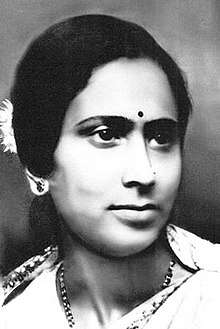Kodagina Gowramma
Gowramma (1912–1939), better known as Kodagina Gowramma, was an Indian writer who wrote in Kannada and lived in Kodagu. She was also a feminist and a supporter of the Indian Freedom Movement.[1]
 | |
| Born | Gowramma 1912 Madikeri, Coorg State, British India |
| Died | 1939 (aged 26–27) Coorg State, British India |
| Pen name | Kodagina Gowramma |
| Occupation | Author |
| Nationality | Indian |
| Literary movement | Feminism |
| Notable works | Manuvina Rani, Aparaadhi Yaaru |
| Spouse | B. T. G. Krishna |
Life
Gowramma was born in 1912 in Madikeri[2] and married to B. T. Gopal Krishna of Gundugutti village of Somwarpet taluk in Kodagu, then known as Coorg, a province in British India.[3] She invited Mahatma Gandhi to her family house, during his campaign in Coorg, and donated all her gold ornaments towards the Harijan (Dalit) Welfare Fund.[4]
She drowned in a whirlpool, aged 27, on 13 April 1939.[5]
Works
Gowramma wrote in Kannada many books and was the feminist ideology using the pen name 'Kodagina Gowramma'.[1] The stories that she wrote, such as “Aparaadhi Yaaru” (Who is the criminal), “Vaaniya Samasye”, “Aahuthi” and “Manuvina Raani”, were modern and progressive and numbered 21. It was her short story ”Manuvina Rani” that made her famous. A volume of her best known stories, entitled Gowramma Kathegalu, were also issued from Madikeri.[3][5]
Influence
Decades later, her works inspired Triveni, another woman writer in Kannada. A volume of Gowramma's stories were published as Mareyalagada Kathegalu and prefaced by yet another Kannada woman writer Vaidehi.[3]
References
- Vēṇugōpāla Soraba, Je Hēmalata (1 September 1995). Women writers in South Indian languages. B.R. Pub. Corp. p. 9. Retrieved 6 August 2014.
- Kallammanavar, Srikanth (5 January 2014). "The roots of Kannada in Kodagu". Deccan Herald. deccanherald.com. Retrieved 14 April 2015.
- Rao, H.S. Raghavendra (1 March 2012). "Pioneering steps". The Hindu. Retrieved 6 August 2014.
- Kamath, Dr. S. U. (1993). Karnataka State gazetteer, Kodagu District. Bangalore: Director of Print, Stationery and Publications at the Government Press. p. 660. Retrieved 6 August 2014.
- Rajan, K. Sundar (8 April 2003). "Short stories (Book Review)". The Hindu. Retrieved 6 August 2014.